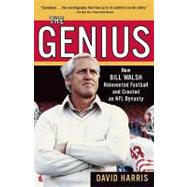
The Genius How Bill Walsh Reinvented Football and Created an NFL Dynasty
by Harris, DavidBuy New
Rent Book
Used Book
We're Sorry
Sold Out
eBook
We're Sorry
Not Available
How Marketplace Works:
- This item is offered by an independent seller and not shipped from our warehouse
- Item details like edition and cover design may differ from our description; see seller's comments before ordering.
- Sellers much confirm and ship within two business days; otherwise, the order will be cancelled and refunded.
- Marketplace purchases cannot be returned to eCampus.com. Contact the seller directly for inquiries; if no response within two days, contact customer service.
- Additional shipping costs apply to Marketplace purchases. Review shipping costs at checkout.
Summary
Author Biography
From the Hardcover edition.
Excerpts
“A LITTLE BIT OF DIGNITY AND CLASS”
It all began with “Mr. D.,” though in the fall of 1978 few in the nine Bay Area counties used such terms of endearment when identifying Edward J. DeBartolo Jr., the hapless owner of their favorite football team. Nor was he yet referred to with the more hip “Eddie D.,” or even the double- edged “Junior.” Instead, it was “that rich kid whose daddy bought him a football team” or “that mafioso dipstick who destroyed the Niners” or, for short, “that asshole.” Every fan within two hours’ drive of San Francisco knew who you meant. DeBartolo had joined the NFL in the spring of 1977 as its youngest franchise owner, hoping to become a man of stature in the sports world, bringing honor on his family while realizing his own deeply held aspirations for belonging, triumph, and acclaim. So far, however, Eddie— barely thirty- two years old, short, pudgy, and in charge for the first time in his life—was a complete flop. And he finally figured out late that fall that he had to do something radical to reverse the situation before it was too late. The most personally trying element in Eddie D.’s dilemma was his fear of disappointing his father, Edward J. DeBartolo Sr., the original “Mr. D.,” who was described by his son as close enough to him to be “like my brother.” DeBartolo Sr., now sixty- nine, was the architect of the family fortune. Born in the impoverished “Hollow” neighborhood in Youngstown, Ohio, in 1909, three months after the death of his natural father, Anthony Paonessa, “Senior” had taken the family name of his stepfather—an immigrant who neither read nor wrote English—and followed him into the concrete contracting business. Then, at the insistence of his mother, Senior worked his way through engineering school at the University of Notre Dame during the Depression by laboring all night at construction sites. He rejoined his stepfather’s Youngstown contracting business until the Second World War, when he was drafted into the Army Corps of Engineers for the duration. Senior returned from the war with an officer’s commission and a $1,500 nest egg reportedly won in military crap games, which he used to capitalize the Edward J. DeBartolo Corporation shortly after his first child and only son was born.
DeBartolo Sr. threw his new enterprise into the still-infant shopping center business and developed some of the first malls at a time when there were fewer than a dozen in the entire United States. Eventually his company built the largest enclosed shopping mall ever, as well as hundreds of similar properties in more than a dozen states, ranking as the nation’s largest shopping center developer by the time the 1970s began. He also acquired several banks, numerous hotels, three horse racing tracks, the Pittsburgh franchise in the National Hockey League, and some seventy other subsidiary enterprises, all headquartered in Youngstown.
By the time Eddie fell on his face out in San Francisco, the privately held DeBartolo family business was worth at least $400 million and Edward Sr. would soon be listed in the Forbes 400 directory of the wealthiest Americans. He was also suspected of Mafia connections, largely because he was a rich Italian contractor from Youngstown. Eddie’s father dismissed the innuendo with great annoyance. “This kind of talk is the curse of anyone successful whose name ends in anior ano,” he complained. “I got where I am by working my ass off every day of my life. I could have turned
Excerpted from The Genius: How Bill Walsh Reinvented Football and Created an NFL Dynasty by David Harris
All rights reserved by the original copyright owners. Excerpts are provided for display purposes only and may not be reproduced, reprinted or distributed without the written permission of the publisher.
An electronic version of this book is available through VitalSource.
This book is viewable on PC, Mac, iPhone, iPad, iPod Touch, and most smartphones.
By purchasing, you will be able to view this book online, as well as download it, for the chosen number of days.
Digital License
You are licensing a digital product for a set duration. Durations are set forth in the product description, with "Lifetime" typically meaning five (5) years of online access and permanent download to a supported device. All licenses are non-transferable.
More details can be found here.
A downloadable version of this book is available through the eCampus Reader or compatible Adobe readers.
Applications are available on iOS, Android, PC, Mac, and Windows Mobile platforms.
Please view the compatibility matrix prior to purchase.
